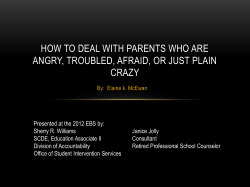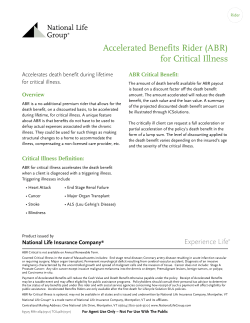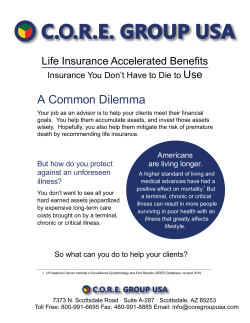
A Better Way Hypnotherapy , LLC
A Better Way Hypnotherapy , LLC Jeff Kramer, DC, PhD, ATC, CHt 7-C Brendan Way, Greenville, SC 29615 (864) 242-5810 www.ABWHypnosis.com Name: _______________________ Date: _____________ Life Event Scale for Assessment of Stress Determine which of the following events you have experienced within the past year. Mean Value 87 77 77 76 74 68 68 65 62 60 58 58 57 57 56 54 53 52 50 50 50 50 50 50 49 48 47 46 45 44 43 Life Event Death of Spouse Death of close family member Marriage Divorce Marital separation from your mate Pregnancy or fathering a child Death of a close friend Major personal injury or illness Being fired from work Going broke or breaking off a marital engagement or a steady relationship Sexual difficulties Marital Reconciliation with your mate Major changes in self-concept or self-awareness Major change in usual type and/or amount of recreation Major change in the health or behavior of a family member Becoming engaged to be married Major change in financial state (a lot worse or a lot better off than usual) Taking a mortgage or loan less than $10,000 (such as purchase of a car, TV, School loan) Change to different line of work Major change in the number of arguments with spouse (either a lot more or less than usual) Entering college Change to a new school Gaining a new family member (through birth, adoption, older person moving in, etc.) Major conflict in or change in values Major change in the amount of independence and responsibility (for example, budgeting time) Major change in social activities Major change in responsibilities at work (promotion, demotion, lateral transfer) Major change in the use of alcohol (a lot more or a lot lass) Revision of personal habits (friends, dress, manners, associations, etc.) Trouble with school administration (instructors, advisors, class scheduling) Holding a job while attending school 42 42 41 41 41 40 38 36 34 33 30 26 22 Trouble with in-laws Change of residence or living conditions Spouse beginning or ceasing work outside the home Change in choice of a major field of study Change in dating habits Outstanding personal achievement Major change in the amount of participation in school activities Major change in church activities (a lot more or a lot less than usual Major change in sleeping habits (sleeping a lot more or a lot less or sleeping during different part of the day) Taking a trip or vacation Major change in eating habits (a lot more or a lot less food intake or very different meal hours or surroundings) Major change in the number of family get-togethers (a lot more or a lot less) Being found guilty of minor violations of law (traffic ticket, jaywalking, etc.) Scoring … Your score is ______. To obtain your score multiply the number of times an event occurred by its mean value. Then total all of the scores. Your score is termed your life change units (LCU). This is a measure of the amount of significant changes in your life to which you have had to adjust. In other words, your LCU is a measure of the stressors you have encountered this past year. □ Low Stress Score: 150 or less Implications for Illness: This indicates that a person has a 37 percent chance of getting a stress-related disease in the next year or two. □ Moderate Stress Score: 151 to 300 Implications for Illness: This indicates that a person has a 51 percent chance of getting a stress-related illness in the next year. □ High Stress Score: 301 or more Implications for Illness: This indicates that a person has an 80 percent chance of getting a stress-related illness in the next year. (G.E. Anderson, “Schedule of Recent Experience.” Unpublished Masters Thesis, 1972. Department of Education, North Dakota State University, Fargo, North Dakota.) Stress Management Tools Name: ________________________________________________________________________ Date: _____________ Quiz to Identify Your Type A, Angry/Hostile, Hot Reactor Behavior PART I: ARE YOU A TYPE A PERSONALITY? Y __ __ __ __ __ __ __ __ N __ __ __ __ __ __ __ __ 1. 2. 3. 4. 5. 6. 7. 8. Answer yes or no to the following statements I hate to wait for anyone or anything. I often interrupt others when they are speaking. I am usually rushed. There’s never enough time in the day. I feel guilty when I have nothing to do or when I play. I get impatient when others perform tasks that I can do faster. I eat faster than most of my friends. I feel stretched to my limits at the end of the day. I think about other things during conversations. Scoring: Part I: Statements in this section demonstrate Type A behavior. If you said yes to three or more of these statements, you probably fall into the Type A behavior category. PART II: ARE YOU TOO ANGRY? Y N __ __ __ __ __ __ __ __ __ __ __ __ __ __ __ __ __ __ __ __ __ __ __ __ __ __ Answer yes or no to the following statements 1. When I drive, I get irritated at drivers who cut me off or drive too slowly. I frequently blow my horn and try to pass them. 2. I have been so mad that I have thrown things or slammed the door. 3. I remember irritating incidents and get mad all over again. 4. Little annoyances have a way of adding up during the day, leaving me frustrated and impatient. 5. I react with gestures, raised voice, and increased heart rate when someone does something incompetent, messy, inconsiderate, or unfair or after an irritating encounter. 6. I think cashiers will shortchange me if they can. 7. I feel anger is justified. I feel an urge to punish people - plot to get back at them. 8. I frequently feel irritated when I stand in line or drive. 9. I like to have the last word in an argument. 10. In a checkout express line, if the person in front of me has more items than the limit, I get frustrated. 11. If I see a non-handicapped person park in a handicapped driver’s space, I feel angry inside. 12. When I am angry, I keep things bottled-up inside, pout, and sulk. 13. If someone is late, I find myself planning the angry words I’m going to say. Scoring: Part II: Statements in this section demonstrate angry/hostile/cynical/hot reactor behaviors. Even one yes response to any of these statements is too many and may be raising your risk of heart disease. Source: American Heart Association. 1997 Heart and Stroke Statistical Update (National Center, 7272 Greenville Ave., Dallas, TX 75231-4596).
© Copyright 2025





















